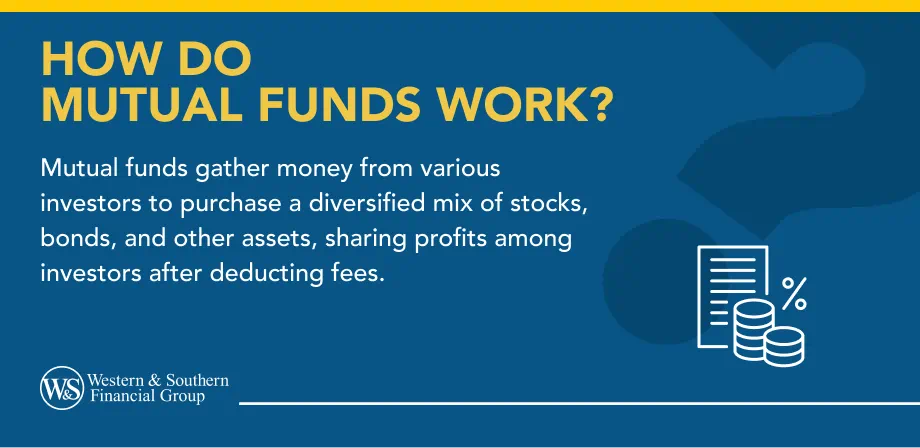Table of Contents
Table of Contents


Key Takeaways
- Mutual funds pool money from investors to invest in stocks and bonds, managed by a professional manager.
- Mutual funds offer benefits like access to more funds, diversification, and potential long-term growth.
- Types of mutual funds include growth, cap-specific, socially responsible, sector, and bond funds, each with unique strategies and risks.
- Investing in mutual funds comes with fees and expenses, which should be considered before investing.
- Mutual funds can be a good way to learn about investments and align with long-term goals, but all investments carry risk and diversification cannot guarantee growth or prevent loss.
Have you ever wondered how mutual funds work or how they could benefit you? Explore the basics of mutual funds to determine if they could help with your investment strategy. Learning more could help you understand if mutual funds could be an excellent choice for your portfolio needs.
What Are Mutual Funds?
Mutual funds are a type of investment made up of a pool of funds from many investors. A mutual fund includes:
- Assets or securities, such as stocks and bonds
- Short-term money market instruments, other securities or assets, or some combination.
A professional mutual fund manager makes decisions on behalf of investors as to which assets to buy and sell.
Advantages of Mutual Funds
So, why might you consider investing in a mutual fund?
- Have access to funds you not be able to afford. You're pooling your money with fellow investors and investing in a collection of many stocks and bonds, you aren't putting all your eggs in one basket, so to speak.
- Purchased to fund long-term goals such as retirement. They may be included as part of a retirement account or an individual retirement account (IRA), and they can be held outside of a retirement portfolio.
Note that mutual-fund investing involves fees and expenses, and many mutual funds require a load or sales charge when purchased or sold. There may also be an annual fee. It's important to be aware of all the fees involved with mutual funds before you invest in them.
Types of Mutual Funds
While there are many different kinds of mutual funds, some of the more common types include:
- Growth funds: Growth mutual funds are diversified portfolios of stocks focused on the increase in capital or in the value of the investments themselves. These mutual funds primarily include newer, high-growth companies that usually reinvest their earnings into making the company more profitable.
- Small-/Mid-/Large-cap funds: "Cap" or "capitalization" indicates the size of the companies a mutual fund invests in. A company's market cap is determined by the number of shares outstanding multiplied by the current market price of one share. For example, a company with half a million shares outstanding selling at $100 a share would have a market cap of $50 million.
- Socially responsible funds: Those interested in connecting profit with purpose may look toward investing in socially responsible funds. These funds include companies that are committed to making an environmental or social impact. The companies invested in typically must meet environmental, social and corporate governance (ESG) criteria.
- Sector funds: Sector funds include companies that are part of a specific industry or sector, such as biotechnology, precious metals or utilities. These funds are concentrated in a narrow part of the market and thus typically offer less diversification than other types of mutual funds.
- Bond funds: Bond funds are mutual funds that include a pool of bonds or debt securities. These funds may include a broad mix of bonds from corporations, government agencies or the U.S. government itself. Some bonds focus on a narrower part of the market, such as high-yield corporate bonds. Some bond funds may also pay out dividends.
Why Buy a Mutual Fund?
Mutual funds are meant to offer a more efficient way to invest than investing in individual companies, and might be a good option for consumers who are starting out and want to learn about different types of investments. They could also be a solid option for those in search of funds that are in alignment with their long-term money goals.
By understanding how mutual funds work, you'll be more informed when considering your approach to growing your money over both the long- and short-term. Please note that all investing involves risk, including the possible loss of some or all of the original investment.
Diversification strategies cannot guarantee growth or prevent a loss in a declining market.
Mutual funds offer a blend of stocks, bonds with shared profits after fees. Start Investing






